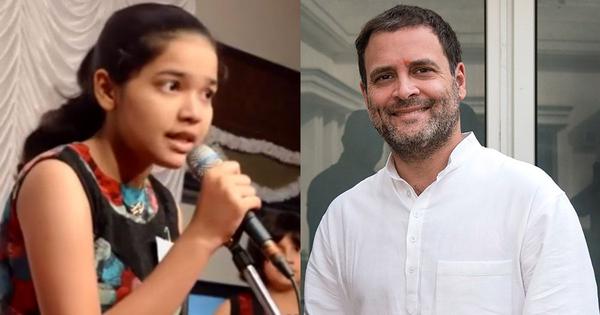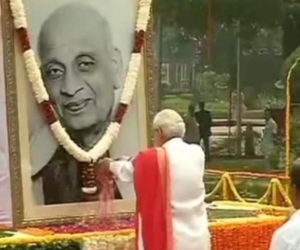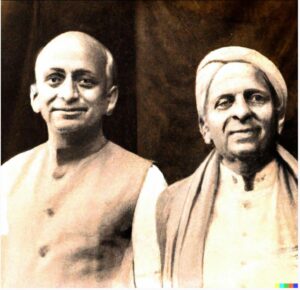
Introduction:
In a disturbing case of spreading misinformation, Mynation.com, a news portal owned by Rajya Sabha Member of Parliament Rajeev Chandrashekhar, recently published a fake news article targeting Rahul Gandhi, a prominent Indian politician. The article claimed that Gandhi was left stumped by a 14-year-old girl’s questions during an interaction in Dubai. However, fact-checking conducted by Altnews.in debunked the entire story, revealing a pattern of disinformation by Mynation.com. This incident sheds light on the alarming spread of fake news in India and its potential consequences.
The Fabricated Story:
The Mynation.com article, which gained traction on social media, portrayed Rahul Gandhi in an uncomfortable position as he struggled to answer the young girl’s questions. It alleged that the Congress party had to cut the live telecast of the interaction due to the impactful nature of the questions. However, two journalists present at the event in Dubai confirmed to Altnews that no such interaction had taken place.
Altnews.in’s Investigation:
Altnews.in, a prominent fact-checking website, conducted a thorough investigation to expose the truth behind the fake news. They discovered that the picture of the girl used in the article was actually a screengrab from a YouTube video of a local speech competition in Mumbai three years ago. The closest she came to discussing politics was mentioning Modi’s Beti Bachao program. This finding discredited Mynation.com’s claims further, revealing the fabricated nature of the article.
Newslaundry’s Insights:
Newslaundry, an independent news outlet, analyzed the incident and highlighted the severe consequences of such fake news. They emphasized that rural areas, lacking access to fact-checking entities, are especially vulnerable to the spread of misinformation. Pratik Sinha, founder of Altnews.in, expressed concerns about the difficulty in countering fake news in India. He explained that while fact-checking platforms serve the urban middle class, large parts of rural India lack such resources, allowing false information to spread rapidly and potentially cause harm.
Mynation.com’s Response and Ethical Concerns:
Following the exposure of their fake news article, Abhijit Majumder, the Editor in Chief of Mynation.com, was approached for a response. Majumder defended the publication’s story, claiming that it was based on information obtained from reliable sources. He stated that although the video of the interaction was not available, they had enough evidence to defend their story if necessary. However, their claims were contradicted by the fact-checking investigation and testimonies from journalists who were present at the event.
The incident not only highlights the issue of fake news but also raises ethical concerns. Mynation.com used the image of a minor without permission or consent, showcasing a blatant act of misrepresentation. The family of the girl, upon being contacted by Newslaundry, confirmed that they were unaware of the picture being used in any article. Such unethical practices further damage the credibility of Mynation.com and contribute to the erosion of public trust in media organizations.
Implications and BJP’s Strategy:
This incident raises concerns about the trust deficit within the news industry. The report suggests that targeting Rahul Gandhi and framing the 2019 elections as a presidential-style contest between him and Prime Minister Narendra Modi is part of the Bharatiya Janata Party’s (BJP) strategy. By highlighting Rahul Gandhi’s alleged fumbling and Modi’s confident demeanor, the BJP aims to position Modi as the only viable choice for the upcoming general elections. However, it should be noted that India’s political system does not revolve around a presidential-style contest, and such tactics may misrepresent the reality of the democratic process.
The Need for Media Literacy and Responsible Journalism:
The prevalence of fake news and the consequences it can have on public perception and electoral processes is a pressing concern. Mynation.com’s repeated instances of spreading disinformation highlight the urgent need for media literacy and responsible journalism. Individuals must be equipped with critical thinking skills to evaluate information, verify it from reliable sources, and discern fact from fiction. Furthermore, supporting efforts to combat fake news, such as fact-checking organizations and initiatives, becomes crucial in safeguarding the integrity of public discourse and democratic processes.
Conclusion:
The alarming spread of fake news, as demonstrated by Mynation.com’s dissemination of misinformation targeting Rahul Gandhi, poses significant challenges to the Indian media landscape. The incident exposes the vulnerability of rural areas to false information due to the lack of access to fact-checking entities. It also raises ethical concerns regarding the use of a minor’s image without permission. As India approaches the upcoming general elections, it becomes imperative for individuals to exercise critical thinking, verify information from reliable sources, and support initiatives combating fake news. By doing so, the integrity of public discourse and democratic processes can be preserved, mitigating the harmful effects of fake news in society.




